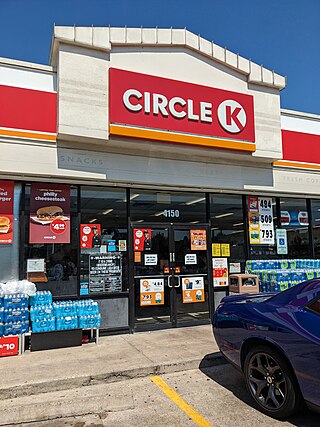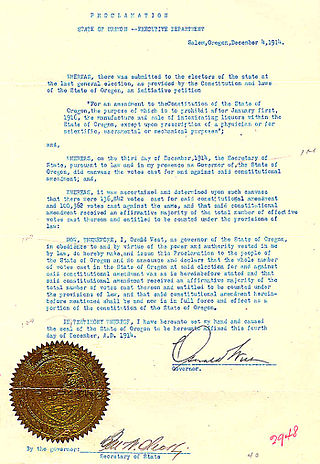
A grocery store (AE), grocery shop (BE) or simply grocery is a foodservice retail store that primarily retails a general range of food products, which may be fresh or packaged. In everyday U.S. usage, however, "grocery store" is a synonym for supermarket, and is not used to refer to other types of stores that sell groceries. In the UK, shops that sell food are distinguished as grocers or grocery shops.

Circle K Stores, Inc. is a chain of convenience stores that is headquartered in Tempe, Arizona, and owned by Alimentation Couche-Tard, Inc., based in Laval, Quebec, Canada. Founded in 1951 in El Paso, Texas, the company filed for bankruptcy protection in 1990 and went through several owners, before being acquired by Alimentation Couche-Tard in 2003. As of February 2020, Circle K has 9,799 stores in North America, 2,697 stores in Europe, and an additional 2,380 stores operating under franchise agreements worldwide.

The Oregon Bottle Bill is a container-deposit legislation enacted in the U.S. state of Oregon in 1971 that went into effect in October 1972. It was the first such legislation in the United States. It was amended in 2007 and 2011. It requires applicable beverages in applicable sizes in glass, plastic or metal cans or bottles sold in Oregon to be returnable with a minimum refund value. The refund value was initially 5 cents until April 1, 2017, when it increased to 10 cents. The Oregon Legislature has given the Oregon Liquor Control Commission the authority to administer and enforce the Bottle Bill. Oregon Beverage Recycling Cooperative (OBRC), a private cooperative owned by retailers and beverage distributors, administers the collection and transportation of returned containers and keeps all the unclaimed deposits. Materials from returned containers are sold by the OBRC and proceeds are handed out to beverage distributors. In 2022, the bottle bill was expanded to include canned wine, which will become eligible for redemption on July 1, 2025.

WinCo Foods, Inc. is a privately held, majority employee-owned American supermarket chain based in Boise, Idaho, with retail stores in Arizona, California, Idaho, Montana, Nevada, Oklahoma, Oregon, Texas, Utah, and Washington. It was founded in 1967 as a no-frills warehouse-style store with low prices. The stores feature extensive bulk food sections.
Fred Meyer is an American chain of hypermarket superstores founded in 1922 in Portland, Oregon, United States, by Fred G. Meyer. The stores are found in the northwest U.S., within the states of Oregon, Washington, Idaho, and Alaska. The company was acquired by Kroger in 1998, though the stores are still branded Fred Meyer. The chain was one of the first in the United States to promote one-stop shopping, eventually combining a complete grocery supermarket with a drugstore, bank, clothing, jewelry, home decor, home improvement, garden, electronics, restaurant, shoes, sporting goods, and toys. The Fred Meyer division is headquartered in Portland.

Lipman's was an American department store chain based in Portland, Oregon. Founded in 1850 in Sacramento, California, the company was originally known as the Lipman–Wolfe & Company, named after the two founding partners: Adolphe Wolfe and his uncle, Soloman Lipman. It eventually grew to six stores in Oregon before they were rebranded to Frederick & Nelson in 1979. The 1912 building in downtown Portland that was the company's flagship store is listed on the National Register of Historic Places, as the Lipman–Wolfe and Company Building.
Pay 'n Save was a retail company founded by Monte Lafayette Bean in Seattle, Washington, in 1940. Over the years, Pay 'n Save was the leading drugstore chain in Washington and was the owner of several Washington-based retailers, including Lamonts and Ernst. A 1984 sale of the company to The Trump Group and a 1986 attempt to transform the retailer into a bargain-basement merchandiser resulted in a loss of nearly $50 million. By 1988, Pay 'n Save was sold to Thrifty Corporation, who later sold the stores to PayLess Drug, who retired the Pay 'n Save name. As a result, most of the retailer's divisions were spun off as separate companies or shuttered. As of 2023, Pay 'n Save's membership discount chain, Bi-Mart, is the sole surviving division of the company.

Marsh Supermarkets was an American retail food chain headquartered in Indianapolis, Indiana, with a peak number of 86 stores in 2013 located throughout central Indiana and parts of western Ohio. Its eventual parent company was Sun Capital Partners, headquartered in Boca Raton, Florida.

The Pantry, Inc. was a publicly traded convenience store chain based in Cary, North Carolina that operated Kangaroo Express stores. The Pantry was founded in 1967 by Sam Wornom and Truby Proctor, Jr. in Sanford, North Carolina The company has been publicly traded since June 1999 and owned by investors since 1987, when then investor Montrose Capital purchased controlling shares from Wornom and Proctor. Recent CEOs have included the former chairman of the board and interim CEO Edwin J. Holman, who took over after Terrance M. Marks, the former president and CEO, resigned in December 2011. Dennis Hatchell was the CEO of the company as of 2012.
Sprouse-Reitz is a defunct chain of five-and-dime stores based in Portland, Oregon, United States. The Sprouse-Reitz Company was founded in 1909 in Tacoma, Washington. At its peak it had more than 470 stores in eleven states in the Western United States.
Haggen Food & Pharmacy is a grocery retailer in Washington State.

G.I. Joe's was a privately owned retail chain for sporting goods, ready-to-wear clothing, and auto parts; that operated stores in the Pacific Northwest region of the northwestern United States.
VPS Convenience Store Group was an American convenience store chain headquartered in Wilmington, North Carolina that could trace its roots to the founding of the first Village Pantry convenience store in 1966. VPS was sold in two parts in 2013 and 2015 to GPM Investments.

Valu-Mart was a chain of discount stores founded in Seattle in 1958. Its parent company was Weisfield's Jewelers. For many years Weisfield's was a store that carried jewelry, as well as televisions, radios, stereos, and other consumer electronics products. Once Valu-Mart was put into place, Weisfield's strictly became a jewelry store. The chain also had stores in Oregon, where they originally were named Villa-Mart. Separate grocery sections in the stores featured curbside grocery pickup by placing the grocery bags into numbered bins that rolled onto a conveyor allowing the customer to drive up to the front of the store to pick them up by giving the attendant a plastic card with the numbered bin they used. The groceries were then loaded into the car usually by store employees.

The U.S. state of Oregon has an extensive history of laws regulating the sale and consumption of alcoholic beverages, dating back to 1844. It has been an alcoholic beverage control state, with the Oregon Liquor and Cannabis Commission holding a monopoly over the sale of all distilled beverages, since Prohibition. Today, there are thriving industries producing beer, wine, and liquor in the state. Alcohol may be purchased between 7 a.m. and 2:30 a.m for consumption at the premise it was sold at, or between 6 a.m. and 2:30 a.m. if it is bought and taken off premise. In 2020, Oregon began allowing the sale of alcohol via home delivery services. As of 2007, consumption of spirits was on the rise while beer consumption held steady. That same year, 11% of beer sold in Oregon was brewed in-state, the highest figure in the United States.
Metcash Limited is an Australian wholesaler and conglomerate company that distributes food, liquor and hardware. The company is headquartered in Macquarie Park, NSW.

Mattress Firm Inc. is an American mattress store chain founded on July 4, 1986. The headquarters of the company is located in Houston, Texas.
Sherman, Clay & Co. was an American musical instruments retailer—mainly pianos—and a publisher and seller of sheet music, founded in San Francisco. Founded in 1853 as A. A. Rosenberg, it was sold to Leander Sherman and Clement Clay in 1870 and was incorporated as Sherman, Clay & Company in 1892. During the 20th century, it gradually expanded its retail operation into a nationwide chain of stores, and by the 1980s it had around 60 stores. It was based in San Francisco until at least the 1970s. In 2013, the company closed or sold its last retail stores.

Amazon Go is a chain of convenience stores in the United States and the United Kingdom, operated by the online retailer Amazon. The stores are cashierless, thus partially automated, with customers able to purchase products without being checked out by a cashier or using a self-checkout station. As of 2023, there are 43 open and announced store locations in Seattle, Chicago, London and New York City.













